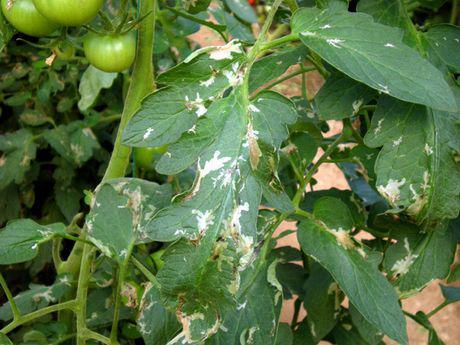Writing in Agronomy for Sustainable Development , they note that climate change is likely to increase this complexity by affecting the distribution of some crop pests (harmful insects, plants and pathogenic agents injurious to crops) and the severity of their outbreaks.

Damage caused by the South American tomato moth (Tuta absoluta ) on tomato. It arrived in Europe (Spain) in 2006 and rapidly spread in Afro-Eurasia. Global change coupled with climate change are believed to be the main factors that favoured the introduction and establishment of this pest
In 'Robust cropping systems to tackle pests under climate change. A review', the ENDURE experts also highlight that climate change is becoming increasingly central within the European policy agenda, mainly with respect to food security in the European Union. They expect this issue will also be recognised in the future EU agenda and that consistent funding will be provided for research in this regard. The authors propose that diversification of current plant protection strategies is needed to mitigate the effects of climate change on European agriculture.
In order to improve current crop protection practices, seven priorities and action plans have been proposed by ENDURE experts. These are:
- An increase in the availability of human resources
- The building of resilient cropping systems
- More research on crop-weed competition
- Anticipation and international monitoring
- Breeding for and sustainable resistance
- Biological control research, also on arable crops
- Pest risk analysis
An effective implementation of such recommendations is expected to help tackle pests under climate change. They conclude: “Although climate change is expected to impact European agriculture, by influencing the stability of crop yield, information on the real consequences are lacking, and studies in this regard remain in their infancy.
“Our inability to make confident predictions highlights a need for new research on several fronts. Policies are needed to fill this uncertainty gap by considering a wide range of possible scenarios. Hence, research based on a broader collaborative approach should be made in order to develop anticipatory adaptive strategies resulting in more resilient cropping strategies and stabilised yields.
“Toward this ultimate aim, enhanced interregional, transnational, and global networking of researchers and stakeholders, at all levels across the plant health/crop protection spectrum, considering the scale and increasing pressures on crop production and yields, is an effective way to better use the limited resources in order to address this twenty-first century challenge in an ever increasing integrated global context.”
Researchers from the team are hoping to present their work at a major conference later this year. We will keep you informed on the website.
Taken from: Jay Ram Lamichhane, Marco Barzman, Kees Booij, Piet Boonekamp, Nicolas Desneux, Laurent Huber, Per Kudsk, Stephen R. H. Langrell, Alain Ratnadass, Pierre Ricci, Jean-Louis Sarah and Antoine Messéan. Robust cropping systems to tackle pests under climate change. A review. Agronomy for Sustainable Development, December 2014. DOI: 10.1007/s13593-014-0275-9
For more information: